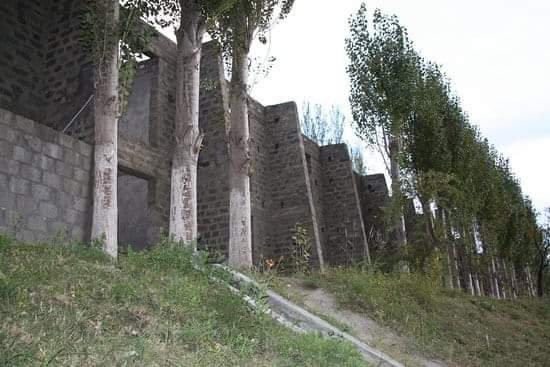Rizwan Qalandar has attempted to translate a song of Rahimullah Rahim, perhaps one of the most difficult contemporary poets, from Hunza.
He is a free soul, a socialist philosopher who started off as a young singer in early 1990s but more recently has turned towards deeply philosophical poetry with messages for the society.
He is perhaps the only poet in Hunza who has touched upon extremely difficult topics like Marxist idea of surplus, a critique of capitalism, ecology and environment, all in Burushaski.
Baleng means walls and this song is about how humans in general and Hunza people in particular have left their “green” lifestyle and started building walls in the quest for an illusion of safety, money and fame. It’s a critique of new market economy, tourism and a deteriorating environment.
Baleng thaanum butan deewshaan
Baleng haranguchi ho but hurushaan
Balengtzum holeh atu seibaan
Balengeh khen deebila seibaan
They’re raising the walls high and are staying between them
They ask me not leave the walls and they say it’s an era of walls
Baleng taq neh be hole doosam
Belengeh ka me be oqo seibam
Balengtuzm ar beh but umaibam
Baleng taq neh faman be etam
How we had torn the walls and emerged? How we saw the walls with demons?
How scared we were of the walls but we had shattered them flat?
Baknegateh da baleng deewshan
Baknegulo raxh bila seibaan
Shoqum dunyaaleh dan phal echaan
Etas bila mes chhanum seibaan
Now they’re building walls on top of walls and feel “safe”
They abandon this wide world and prefer to close their hearts narrow
Shiqam ka jee shiqam seibam
shiqamulo jee bila seibam
Shiqam ka dim shiqam meibam
shiqam jeetzum ke yar seibam
Green was once their life and their lives were green
They would go greener with green and prefer it over their lives
Balneg dewwsin maleng rat echaan
Basang dewlin baseng phas echan
[Gapantz duisn gapatnz gash ochan]Gapatnz thang ho eltalan
Now they build the walls and crush the green fields
They’re ending gardens to build abodes
They’ve turned it into Gappantzeh prison (prison in Baltit Fort Hunza)
Shul asaan aitzanan seibam
Tushaar siseh ishqe jook heibam
Gashay dunyatze hesh apam
Shuleh badlawlo shul uyacham
They would advise not to take love light and many of them were aware of the yearnings of love
Not much aware of the market world, they used to barter in love
Shuleh gamisho ke ghul gaiban
Maleng gash ne meling gaiban
Malangie shul ke gash itzaiban
Sutozeh khin be hesh seibaan
Now they charge tax on the surplus of love and sell their fields to buy liquor
They seek transaction in the mad man’s love
What does he know of profit they say?
Baleng taq ne garaarar rai
Shuleh gamisheh qararar Rai
Datoo makuchi bahar Rai
Balum asej shuleh sitarar rai
I want to tear down the walls and get the epitome of loyalty in love
I wish blossom in the middle of autumn and the lost Sitar of my heart
Jehel Bes herimo het etaan
behel ma ghuntze tak Bes etan
Adab nesqul mathel Bes etan
Subash gash ne abash Bes echaan?
Why have you freed ignorance and tied admiration outside?
Why have your burnt your values into trash?
Why have you traded the solutions for problems?
Balum iteh hooya het aar suin?
Uyamkusheh shule nafas aar suin
Qafas taq etas sabaq aar suin
Baleng dewras hunar aar suin
Bring me back the lost free wilderness, the sweet prayer of love
Bring the lessons of breaking the prison and the skill of breaking the walls!
Baleng thaanum butan deewshaan
Baleng haranguchi ho but hurushaan
Balengtzum holeh atu seibaan
Balengeh khen deebila seibaan
They’re raising the walls high and are staying between them
They ask me not leave the walls and they say it’s an era of walls.
Rizwan K. Qalandar is a faculty member at IIS London and writes on social issues.

The High Asia Herald is a member of High Asia Media Group — a window to High Asia and Central Asia

